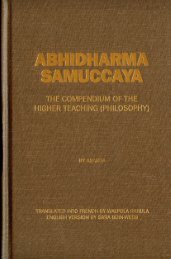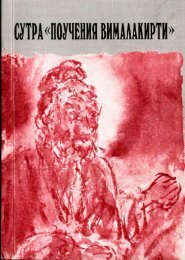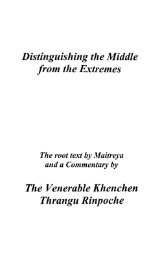ABHISAMAYALAMKARA
ABHISAMAYALAMKARA
ABHISAMAYALAMKARA
You also want an ePaper? Increase the reach of your titles
YUMPU automatically turns print PDFs into web optimized ePapers that Google loves.
20 ANALYSIS Of<br />
beings which is identical with the Unique Monistic Principle,<br />
the negation of all separate individual existence, 1<br />
and Great Commiseration. The Bodhisattva, having made<br />
the following vow :—May I become a fully accomplished<br />
Buddha and after that manifest my energy in acting for<br />
the weal of other living beings, as far as they are worthy,<br />
by preaching the Doctrine of the 3 Vehicles,—brings this<br />
vow to accomplishment through his activity (on the Path),<br />
—Thus we have the mind striving for Enlightenment (or<br />
the Creative Effort of the Bodhisattva) which has for its<br />
aim the weal of other living beings, is characterized<br />
by the will of attaining Enlightenment,—the ultimate result<br />
with the factors conducive to it, and being essentially<br />
of 2 kinds, manifesting itself as the vow and the<br />
action according to it, as it is said 2 :—Just as we know<br />
the difference between one who wishes to go and one<br />
who goes, in a similar way the wise must know the difference<br />
between these two (forms of the Creative Effort).<br />
[Abhis. aloka, MS. 24a. 10 - b.6]. 3<br />
f fa<br />
# fsrffJrffi stfigsm<br />
: II<br />
The following text of the Abhis. aloka 1 refers to a<br />
special question :—According to the Sutralamkara IV. I,<br />
the mind striving for Enlightenment appears as a form<br />
of consciousness 5 (as belonging to the group of elements<br />
of consciousness), 6 which has the representation of a<br />
f I.e. that the Absolut© is trie common ultimate essence of<br />
all living beings and all elements rf existence.<br />
2 Bodhicaryavatara, I. 16.<br />
3 The order of the Minaev MS. is inverted. For ths Tibetan<br />
Version of this passage, cf. Appendix.<br />
4 MS. 24b. 1-25a. 2.<br />
: 5 citta = sems, synonymous with vijnaha = rnam~ses,<br />
6 vijnana-s%andhaz=rnam~ses-kyi~phun-po.<br />
: II<br />
THE ABH1SAMAYALAMKARA 21<br />
special object and is connected with (the mental phenomenon<br />
of) will. 1 On the other hand we speak of ciitauipada<br />
as the desire for attaining Supreme Enlightenment<br />
which is, to speak otherwise, a striving for the elements<br />
of virtue. This striving, this desire is to be classified<br />
among the group of forces," since it is (not the fundamental<br />
mind, but) a mental phenomenon. In such a<br />
case, how can (this desire, solicitation etc.) be termed the<br />
origination of the mind, striving towards Enlightenment'}—<br />
Such an objection has of course a basis. However, when<br />
there exists the desire of becoming possessed of the<br />
element of virtue, and the intention of rescuing the<br />
living beings, this by seeing them helpless and sunk in<br />
the ocean of Phenomenal Existence, (the Bodhisattva)<br />
arouses to life (within his own stream of elements) the<br />
mind directed towards the attainment of Buddhahood.<br />
Thus the effect (the mind striving towards Enlightenment)<br />
is (metaphorically) indicated here by its cause (che desire<br />
of rescuing the living beings). This metaphorical form<br />
of expression is taken recourse to in order to make it<br />
known that with the Bodhisattva who is possessed of<br />
such a desire and solicitation, all the virtuous elements<br />
become developed. There is thus no mistake (in<br />
admitting such a form of expression).<br />
Otherwise, the desire, the solicitation for Enlightenmen:<br />
may be regarded as manifesting itself in the vow<br />
(of the Bodhisattva). Accordingly, the mind striving for<br />
Enlightenment connected with this vow is indicated here<br />
as "the prayer or the effort for Enlightenment." Indeed,<br />
it is said that the vow is a predominant factor with him who<br />
gives origination to the mind striving for Enlightenment.<br />
Thus we have to say that this mind becomes originated<br />
with the Bodhisattva being invariably connected with the<br />
vow, and this is to be regarded as correct.—13 ^<br />
1 ceiana—sems'pa.<br />
2 sams1iara~8kandha==hdu-byed-ktii phun-po (Rnam-bsad. 53a, 3).<br />
3. "Great by its energy, gteat by its activity, great by its aim,<br />
and great by its result is the will of the Bodhisattvas, pursuing a twofold<br />
aim. Sucb is tn© origination of the mind (striving towards<br />
Enlightenment)'*—Haribhadra's interpretation seems to be somewhat<br />
strange if we compare Vasubandhu's commentary on this verse, where<br />
it is said that the wi 11 ! (cetana\ itself represents the citta-utpada> but<br />
not "the mind connected with the will (tri guna dvaya-alatnbana ca<br />
cetana ciitoipada iiy ucyate).'*<br />
20


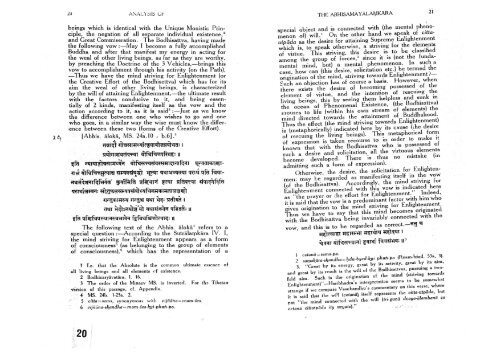
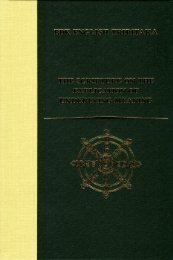
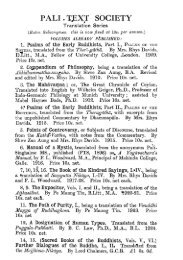






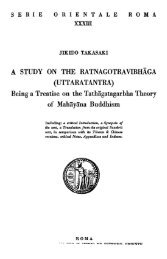
![Long Discourses of the Buddha [Digha Nikaya]](https://img.yumpu.com/32792419/1/164x260/long-discourses-of-the-buddha-digha-nikaya.jpg?quality=85)
